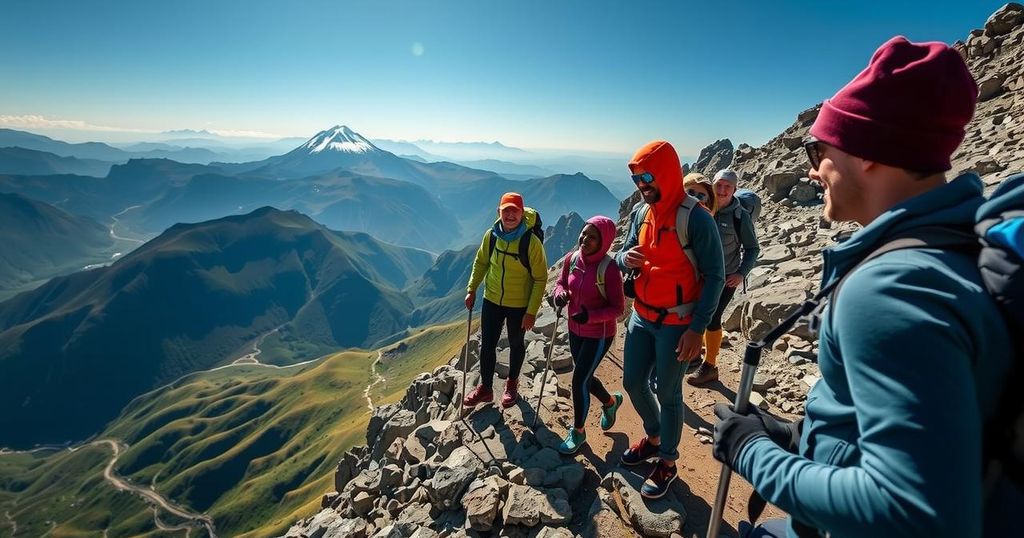Four New Mexico alumni climbed peaks in Ecuador to promote access to prosthetic care, with a focus on enhancing mobility for individuals with disabilities. They engaged in fundraising efforts in partnership with The Range of Motion Project, raising over $350,000 to improve accessibility in Latin America. Their personal journeys of overcoming adversity fuel their advocacy to bridge accessibility gaps and support individuals with limb loss.
In October, four individuals from New Mexico took on a significant challenge by climbing some of Latin America’s tallest peaks in Ecuador to advocate for enhanced accessibility to prosthetic care. Among them were three graduates of the University of New Mexico: Kyle Stepp, Sean O’Neill, and Jacob Fox, who ascended Cayambe, while Allison Gordon, a former medical resident, tackled Chimborazo, Ecuador’s highest mountain. This initiative aimed to raise awareness around the critical need for mobility solutions for individuals with limb differences. Kyle Stepp articulated their common belief in mobility as a fundamental human right, stating it should be universally accessible, emphasizing the solidarity within the group as they championed disability rights. Sean O’Neill remarked on the pride in having members of their community actively working to address these pressing issues, reflecting the commitment to social responsibility among New Mexicans. The World Health Organization reports a dire statistic, estimating that only one in ten individuals in need have access to essential assistive products, including prosthetics, due to barriers such as high costs and inadequate policies. Ecuador faces similar challenges, with inadequate provision of prosthetic care for individuals with limb loss. This reality led to the inception of The Range of Motion Project (ROMP), a non-profit organization founded a decade ago to enhance access to prosthetic services in Ecuador and beyond. The anniversary of ROMP was marked by a significant milestone, with teams attempting to reach three towering summits: Chimborazo, Cotopaxi, and Cayambe. During their experience in Ecuador, the team witnessed the impact of their efforts as ROMP delivered prosthetic devices to 50 patients, showcasing the life-changing potential of mobility aid. Stepp described the transformative experience of watching individuals walk and run for the first time, reaffirming the critical importance of their advocacy. While their team reached approximately 17,000 feet on Cayambe, adverse conditions forced a retreat. Stepp fondly recalled the unforgettable moments of camaraderie, even engaging in a playful snowball fight as a testament to the spirit of joy and resilience found in mobility. Collectively, efforts during the hike resulted in the successful fundraising of over $350,000. Kyle Stepp’s personal journey adds depth to the mission; diagnosed with Osteosarcoma at age 14, he underwent a series of arduous treatments that culminated in amputation later in life. His experience profoundly influenced his advocacy work to improve access to prosthetic devices and insurance coverage for individuals with limb loss. Alongside fellow advocate Nicole Ver Kuilen, Stepp co-founded the initiative So Every BODY Can Move, which seeks to legislate insurance support for activity-specific prosthetics, achieving notable successes across eight states within two years. Stepp remains a vital force in both local and national advocacy realms, having initiated LoboTHON, UNM’s largest student-run philanthropy. His dedication continues as he prepares to compete in international triathlons, representing Team USA at the upcoming Los Angeles 2028 Paralympic Games. This collaborative endeavor by New Mexicans serves as a powerful reminder of the importance of advocacy and community involvement in addressing accessibility challenges faced by individuals with disabilities, illustrating that with determination and support, significant progress can be made toward improving quality of life for many.
The undertaking by these New Mexico alumni reflects a growing awareness around the global disparities in access to prosthetic care, particularly in developing regions such as Ecuador. The advocacy efforts are crucial as statistics reveal that a significant number of individuals with limb differences lack adequate resources and support. The Range of Motion Project, with its focused mission, plays an essential role in bridging this gap, offering not only physical tools for mobility but also promoting a greater understanding of disability rights as a human right.
The climb undertaken by the UNM alumni underscores a critical alignment between personal experiences of adversity and broader advocacy efforts aimed at improving access to prosthetic care in underserved communities. Their achievements in fundraising and raising awareness highlight the role of community and solidarity in addressing systemic barriers faced by individuals with limb differences. As they continue to advocate for necessary changes in coverage and policy, they exemplify the significance of combining personal narratives with collective action towards meaningful social change.
Original Source: news.unm.edu






